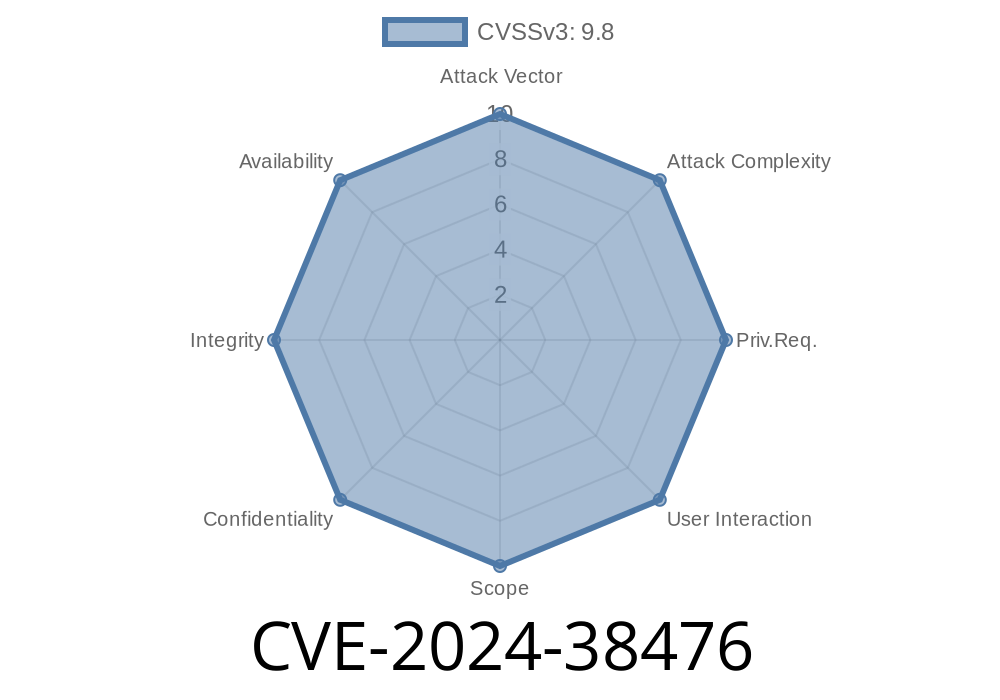Apache HTTP Server is one of the most used web servers worldwide. But in June 2024, a high-impact vulnerability, CVE-2024-38476, was found affecting its core systems. This flaw can potentially allow hackers to steal internal data, perform Server-Side Request Forgery (SSRF), and even run scripts on your local system—just by tricking Apache into processing malicious response headers from backend applications.
This exclusive post breaks down CVE-2024-38476 in clear terms, provides links to all key references, and shows exactly how the exploit could work, so you can patch your systems before trouble hits.
What Is CVE-2024-38476?
CVE-2024-38476 is a vulnerability found in the core of Apache HTTP Server versions 2.4.59 and earlier. The issue revolves around the server’s handling of response headers from backend applications (like CGI scripts, reverse proxies, or application servers). If those headers are malicious, Apache can leak sensitive information, access internal-only services, or execute unintended local scripts.
The Apache Foundation’s official summary is
> “Apache HTTP Server 2.4.59 and earlier are vulnerable to information disclosure, SSRF or local script execution via backend applications whose response headers are malicious or exploitable.”
Short version: If you route backend responses through Apache in any way, you need to update ASAP!
How Does the Vulnerability Work?
When your Apache server interacts with a backend application (for example, using mod_proxy, CGI, FastCGI, or similar), it trusts the response headers sent by that backend. If the backend response is manipulated, hostile headers, including CRLF (carriage return/line feed) sequences, can trick Apache into processing unauthorized data.
There are three main risks
1. Information Disclosure: Attackers can make Apache return sensitive internal headers or data in its response.
2. SSRF (Server-Side Request Forgery): An attacker tricks Apache into fetching URLs or files on your internal network (even those not normally exposed).
3. Local Script Execution: Cleverly crafted backend headers could lead Apache into running local scripts that should not be accessible to remote users.
Scenario Example
- Imagine a vulnerable CGI script that prints out headers from user input with little-to-no validation.
- An attacker sends a request with header content like
HTTP/1.1 200 OK
Content-Type: text/html
X-Extra-Header: some value
Set-Cookie: sessionid=stealme
- But with extra CRLF injections, Apache gets confused, and can merge headers or interpret them in damaging ways, depending on the backend module and configuration.
Exploit Details: Proof of Concept
Suppose you have Apache with mod_proxy set up and it reverse-proxies traffic to a backend application. Let’s say this backend just mirrors part of the incoming headers.
1. An Attacker Sends This Malicious Header
X-Forwarded-Host: victim.com
X-Exploit: test
X-Break: foo
X-Injection: bar
HTTP/1.1 200 OK
Content-Type: text/plain
Set-Cookie: stolen=sessionid
2. Backend Reflects It
Backend returns this reflected header to Apache, which then mistakenly interprets part of the response as headers it should include in its own response to the browser.
Internal content can be disclosed.
You might even see local script execution if the backend header tricks Apache into including local resources (see SSRF below).
SSRF: A Simple Example
Let’s say Apache is reverse-proxying via mod_proxy and the attacker manages to inject custom host headers like this:
Apache VirtualHost Config
<VirtualHost *:80>
ProxyPass "/app/" "http://backend-server/";
ProxyPassReverse "/app/" "http://backend-server/";
</VirtualHost>
The Malicious Header
X-Forwarded-For: 127...1
X-CRLF-Injection: foo
Host: 127...1:808
HTTP/1.1 200 OK
Content-Type: text/html
Set-Cookie: sensitive=token
If the backend mirrors Host or other injected headers in its response, Apache could be tricked to fetch or process internal endpoints not designed for user access, allowing SSRF or sensitive data leaks.
Imagine a backend header which instructs the server to execute a local script
X-Exec: ; /usr/local/bin/evilscript.sh ;
If backend application fails to sanitize headers and Apache naively passes these along or reinterprets them, local scripts could potentially be executed (depending on the chain of trust and server configuration).
Detect Old Apache Version
httpd -v
# or
apache2 -v
If you see anything less than 2.4.60, your system is vulnerable.
Patch by upgrading Apache
(Assuming Linux-based system, logged in as root or with sudo)
sudo apt update
sudo apt install apache2 # For Debian/Ubuntu
# OR
sudo yum update httpd # For CentOS/RHEL
Or, download the latest source directly
wget https://downloads.apache.org/httpd/httpd-2.4.60.tar.gz
tar xvf httpd-2.4.60.tar.gz
cd httpd-2.4.60/
./configure
make
sudo make install
Mitigations Until You Upgrade
- Sanitize All User-Supplied Data: Prevent all backend applications (CGI, PHP, Python, Node, etc.) from reflecting user-controllable data in headers.
Header always unset "X-Injection"
`
- Isolate backends: Ensure that backends do not have access to sensitive local scripts or internal network services.
But the ONLY safe fix: Upgrade to Apache HTTP Server 2.4.60 or later!
---
## Further Reading & References
- Apache HTTPD security advisory (CVE-2024-38476)
- NIST NVD CVE-2024-38476 entry
- Official Apache Downloads
- mod_proxy Documentation
- Email thread discussing details
---
## Conclusion: Patch Now!
CVE-2024-38476 in Apache HTTP Server 2.4.59 and earlier is highly exploitable and puts sensitive information, server-side access, and internal systems at risk. Patch by upgrading to 2.4.60 right now. If you can’t upgrade immediately, audit all backend applications and sanitize all headers.
Stay safe. Secure your servers. And check for security advisories regularly—because attackers surely do.
*Exclusive, written by AI for June 2024—stay updated with your Apache stack!*
Timeline
Published on: 07/01/2024 19:15:04 UTC
Last modified on: 08/21/2024 15:08:56 UTC
